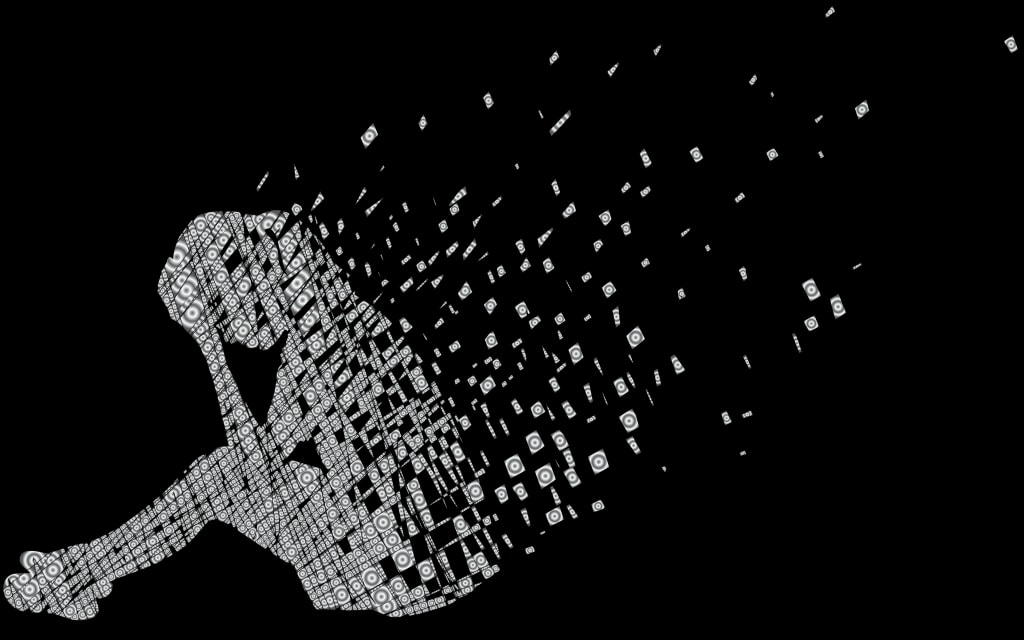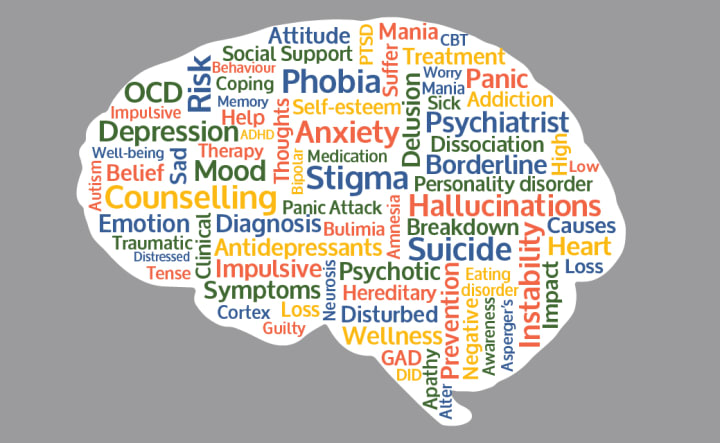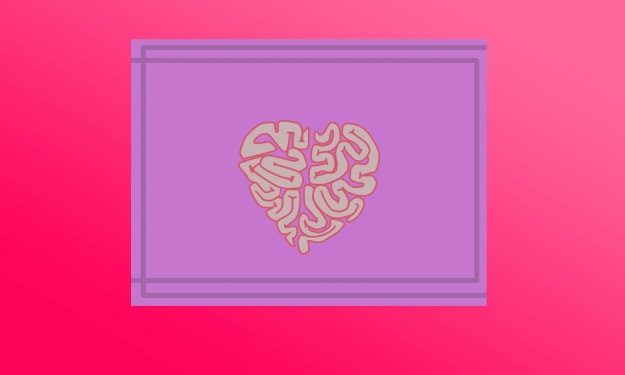
We Make Excuses: Part Two, The Solution
Through a series of hospitalizations and suicide attempts, I found my truth somewhere along the way. In my last article, I talked about my story, and I’m going to talk to you about the things I’ve learned now. Without fear, I have spoken to you my own truth, unashamed, and now I will speak to you my own wisdom, equally unashamed.
Trigger warning: Self-harm, suicidal thoughts and actions, abuse, drugs/alcohol, rape (in Part One), relationship difficulties, depression, anxiety, and… Incredibly Tough Self-Love.
There is no doubt in my mind that I’ve led a very complicated life, as probably many of you have as well. I was diagnosed with borderline personality disorder; I was medicated, and I was sent to talk therapy, which in my opinion only fueled this cyclic negative thought pattern. I was validated for every terrible thought I had and greeted with “hmm” and “mhmm” and “that makes sense”; and too often, given very few solutions. Of course, it was understandable; of course, it made sense I was depressed and anxious. Of course, all of these things made profound sense considering what I had been through up until that point, but I continued to suffer with little relief from medication or talk therapy. I stopped drinking and tried things “sober,” but still smoked pot religiously like medication. I rationalized it by saying, "I need this. If I don’t have this, I will freak out." I reinforced thought patterns in myself by drawing up evidence for thoughts like, “no one cares,” “nothing will get better,” “I will never be happy,” with small unrelated events serving as "proof." Someone wouldn’t respond to my texts: "No one cares." After crying episodes and panic attacks: "I will never be happy." After flashbacks: "Nothing will ever get better."
And I felt truly alone. I couldn’t stand to be alone for even a second. By this time, I mentioned, I’d moved back in with my mother, and just had taken to ignoring my stepfather (with much difficulty). I was unemployed, and still smoking pot, justifying my low energy as a side effect, but I had dreams of being a musician and a writer. I had been putting tracks out here and there and received some great feedback. I was dating another music producer (tricky thing, though, because my “husband” had been a music producer as well, and there were some very deep scars there). I went in and out of hopefulness, but time had been making me a little bit better and I was being somewhat productive.
Then another breakdown came, and it was this breakdown that saved me. My suicide note was found and I was hospitalized for six weeks. The first two weeks, I was entirely noncompliant in the crisis center, but then something happened. After gushing out my long and painful story, a psychiatrist in the crisis center drew a pyramid. At the top was "thoughts." The bottom two were "behaviors" and "feelings."
“Which of these can you change?” he asked placidly.
“None… Behaviors, I guess? Can you just give me something for anxiety and let me leave?”
“You can change your thoughts too with much difficulty. You have had these things happen to you which have made you think in ways that continue behaviors that lead you continually down destructive paths. If you change your behaviors and change your thoughts, your feelings will change with time. I’m sending you to a residential.”
At that point, I had state insurance, so it was the responsibility of state medical coverage to cover that. With the idea that I’d not have to go back to the stressful situation with my stepfather, I agreed without hesitation, even though at the time, I was thinking what this doctor said was absolute crap.
At that residential facility, through five hours a day of therapy, I found a strength to face what I was feeling. I had never before faced it. Prior to this, I thought of feelings like these burdens placed on us by others. When I left, the residential psychiatrist recommended me for Dialectical Behavioral Therapy.
Tough Fuckin’ Love: What I Learned
DBT changed my life even more. It enabled me to face these things that had happened to me and taught me the skills I needed to overcome them. I moved out of my mother’s house again, and this is what enabled me to learn fully, I believe. I stopped drinking and using hard drugs entirely, and cut back on my pot use so I could focus.
Are you ready for the big truth on depression and anxiety? It’s perpetuated by the way you think. I thought all these years that my thoughts were caused by the depression and the anxiety and that my victimhood was the only reason for them. I didn’t take responsibility for them because I didn’t see them as anything other than a byproduct. I learned that you don’t control your thoughts through absolution—rather, you control your thoughts by noticing what they are, and then telling them where to go. You don’t take every feeling as fact because it’s not. Sometimes our feelings lie to us. They tell us that we’re not good enough, have the energy to deal with it, or that we don’t deserve it. You use anxiety and depression as motivators to make something better. You use guilt to allow you to repair. You use pain like a lotus uses mud: to GROW FROM. Growing is an exhausting business.
You see, it’s not what happens to you, it’s how you respond. You very well might be clinically depressed. It happened, don’t dwell. How can you make it better? You tell your thoughts to simmer down and go do something else. You cope, you survive. You don’t avoid. If you’d had a heart condition, you would not allow it to run rampant—you would see a doctor and take the doctor’s advice. Positive thinking and doing positive activities may seem so counterintuitive when you’re depressed, but that is why there is the diagnosis of clinical depression, because your feelings are not cooperating with what is logical. You have to relearn how to live. You can either be a victim of life and the things that have happened to you, or a victim of your chemicals, or you can choose to survive. Each is a choice. I never said it was an easy one, but survival is a choice. It’s a long road back sometimes.
There is a very liberating fact, and you already may have heard this many times in your own thoughts: no one cares. That’s right. No one cares. They all have their own pain in their life. No one is going to sit back and cry for you. I’ve lost jobs over this, I’ve lost friends, I’ve lost time, I’ve lost money, I’ve lost love. It’s up to you to pick up the pieces yourself, and you know what they say: If you want something done, do it yourself.
This is NOT to say do not seek support, but it’s incredibly liberating to know that it is within your hands! For those of us without health insurance, there are many books on DBT and other therapies, and I know a few people who have been doing it themselves for years. There are support groups for free online, with many people, such as myself, who frequent them and help others in need. The internet is a beautiful invention and a powerful tool: Use it. No one ever said recovery was easy and you have to want a change in order to make one.
It is hard!

It’s hard to get out of bed and stop binge-watching Netflix from the safety of your bed because you’re scared of what’s going to happen or because you don’t have the energy to deal with whatever will happen, but that’s also the problem. Nothing ever happens when you’re in bed, and although that may seem comforting, when you truly look at it, it’s terrifying. When you allow yourself to do this, you are fueling your own despair; you are allowing life to pass you by. Fight it. It’s the hardest thing you will ever have to do. A pill alone will not fix you; a few therapy sessions will not fix you; only YOU can fix you. There is nothing scarier than having to rely on yourself when you’ve historically been what you deem to be unreliable. Facing these thoughts, owning them, pushing yourself… It’s no simple task, but recovery is NOT a simple task. It’s a lot of talking yourself into doing the best thing for yourself, even when you feel you don’t deserve it. It’s a lot of reaching out even when you feel like no one cares. It’s a lot of breaking down and crying and feeling overwhelmed and picking yourself back up. It’s worth it, though.
Depression is simply existing, taking no pleasure in things. It’s ruminating for hours trying to figure out why you’re sad when you don’t even know why, so you just come up with reasons. It’s episodes of clawing at your skin while crying under a cold shower faucet just trying to hold it together. It’s seeing how great everyone’s life is on Facebook or Instagram and feeling like you’re just such a waste of space. It’s making plans on a somewhat good day and canceling them when the day comes because you’re too sad to move or you are worried about being a downer for your friends. It’s feeling like you’re not worth anyone’s time and feeling like you’d be better off dead. It’s days without eating because you feel too overwhelmed to cook. Anxiety is chest pains and hours of "what if’s" about going out until your friends have long left without you. It’s thinking that you can never trust anyone because everyone leaves or everyone hurts you in the end. It’s running to the bathroom to have a panic attack in the bathroom stall because having one in public feels so shameful. It’s nights without sleeping because you’re afraid of the nightmares and you can’t ignore that pit in your stomach. These things are hours of life STOLEN FROM US. We are stealing our own lives when we opt to not try because we are allowing the disease to beat us!
Fight it with all you’ve got.

You are not your diagnosis: you are a human being. A person with diabetes, while considered a diabetic, does not find their sole identity in it, and likewise, I will tell you now, you won’t find your own identity in your depression or any medical diagnosis. You are a full person. As much as it may not seem like it right now, you are there. Parts of you may be hiding, that happy part, elusive. Seek treatment, open up, reach out, fight these feelings, and keep going. If you have to, take the medication. Change your diet. Make time for a 30-minute brisk walk around the block, or a craft project or something that inspires you. Do things for YOU. It’s an ongoing battle to fight these feelings, and no one ever said it was going to be easy. A therapist can help you identify the things holding you back from your recovery of your anxiety and depression, but you have to be honest with them.
I would recommend DBT to anyone. It’s not centered around the past. It’s centered around building a future for yourself that makes you want to live. It gives skills to manage difficult interpersonal situations, to handle extreme emotional dysregulation, and to handle really anything that life will throw your way with skills ranging from TIPP (a distress tolerance skill for panic attacks and flashbacks) to DEARMAN (an interpersonal relationship skill to get a need met), and even Radical Acceptance (for the things that we cannot change). This skills are difficult and require an enormous amount of practice and DBT is a commitment: one year, and it will probably be one of the hardest years of your life, but when you’re ready for a change, you will do whatever it takes.
I’m in the process of building a life I can be proud of: working hard on my novel, my relationships, and when I have some time, I still work on my music. It’s been a long while since I’ve self-harmed, but I’d be lying if suicidal urges and self-harm urges didn’t still happen from time to time. I let them go now, sometimes with more ease than other times, recognizing their ineffectiveness in problem-solving. After all, I have a great many skills as options I’d not had before. I’ve learned to love and trust again, and I’m in a five-year committed relationship now.
Life is filled with challenges, but I’m meeting them head-on—and you can too! My stepfather and my mother’s weakness for believing his lies is an inevitability and he’s as verbally abusive as ever. I gently avoid as much as possible. Given that my mother is dying of leukemia at this point, I just focus on her and my relationship and try to not let his attacks get to me when I do come to visit her. I still deal with things—that’s life. After all, he was jailed once for assaulting my sister and me for a month, and my mother still took him back. I strongly doubt any of that would change now. I validate that he is an angry person who has never reconciled with his issues and that’s why he takes them out on those weaker than him: power and control where he has none. I validate her fear of being alone, and her lack of a backbone, her normalization of toxic and abusive relationships. I don’t have to agree with her views to love her and our time is now limited, and he and his opinions are about as relevant as a mosquito.
Don’t dwell. Persevere.

The past is completely intangible: you cannot change it. Is it always fair? No, it’s not, but we don’t live in a world of how things should be. They just simply are. Moving on is easier said than done, but if you dwell, you aren’t moving on. You can beat this. You can do this. Reach out, seek help, be open, be honest, help others, but most of all: HELP YOURSELF.
A psychiatrist I saw many years ago gave me a few simple words that have never served me wrong: Be kind to yourself. You deserve it. Happiness is fleeting, but peace is generated from within. Make peace with yourself. You’re stuck with you forever and you owe it to yourself to build the best life possible because regardless if you believe in an afterlife or not, this life is precious. Build it to be what you would like, no matter how long, how difficult the road is. It gets easier. When you learn to walk first as a baby, you fall on your ass a lot, but you have persevered and you now walk without thinking about it. You deserve peace. However you choose to proceed, stop making excuses for why you can’t, and start thinking of HOW you can.
About the Creator
Sarah A
Mystifying the mind one article at a time :-)






Comments
There are no comments for this story
Be the first to respond and start the conversation.